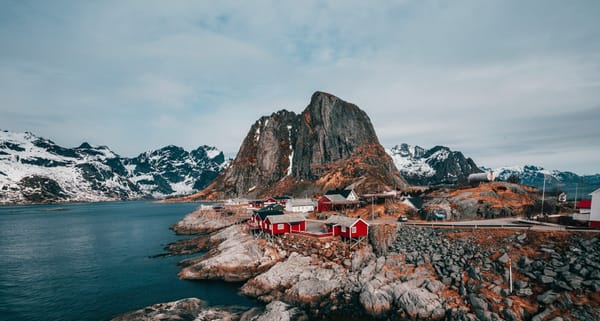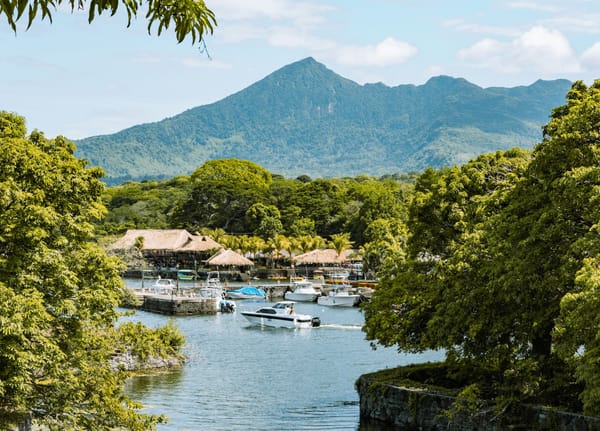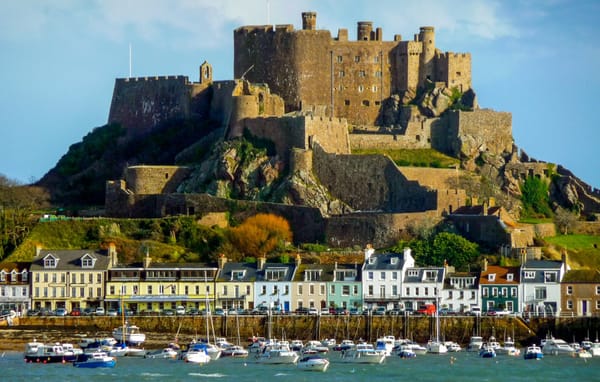
The Freedom Passport: Argentina Citizenship by Investment
Learn more about our proposed Citizenship by Investment program in Argentina and how it would improve the economy of the country.
A golden visa is a residency-by-investment program that allows high-net-worth individuals and their families to obtain residency and a fast-track citizenship in a foreign country by making a significant investment in its economy.

Learn more about our proposed Citizenship by Investment program in Argentina and how it would improve the economy of the country.

Spain's Golden Visa program stands apart, offering an unmatched combination of flexibility, stability, and opportunity that has attracted investors from across the globe, from American entrepreneurs to Chinese industrialists.

This long-term residence permit offers a host of benefits and opportunities, whether you're an investor, entrepreneur, or an outstanding talent.

Argentina stands at a transformative moment in its investment migration landscape. Following sweeping reforms under Decree 366/2025, the country now offers two distinct pathways for high net worth individuals seeking residency or citizenship through investment.


Greece's residency-by-investment program offers one of Europe's last accessible pathways to EU residency through real estate investment. The program underwent significant restructuring in 2024, introducing a three-tier system that balances investor accessibility

Norway does not offer a traditional Golden Visa program. Unlike neighboring European countries with passive investment schemes, Norway's approach to investment immigration requires active business engagement through its self-employed residence permit system.

New Zealand's Active Investor Plus Visa program represents one of the most streamlined investment pathways to residency in the developed world, following significant reforms implemented on April 1, 2025.

Nicaragua offers the world's most affordable investment-based residency program at just $30,000, providing immediate permanent residency with minimal physical presence requirements.

The Netherlands officially abolished its Golden Visa program on January 1, 2024, marking the end of an investment-based residency pathway that struggled to attract investors throughout its 11-year existence.

Monaco maintains one of Europe's most exclusive residency programs, though it differs fundamentally from traditional "golden visa" schemes. Rather than offering residency in exchange for specific investments, Monaco requires

Malaysia operates two distinct residency-by-investment programs that generated over RM455.8 million (US$102 million) in the first half of 2024 alone, positioning the country as a strategic middle-market player in Southeast Asia's competitive investment migration landscape.

Luxembourg's residency by investment program faces imminent termination after receiving only 15 applications in seven years, with government officials actively reviewing its closure following a 67% rejection rate in 2023-2024

Kuwait stands apart in the Gulf Cooperation Council as the only member state without a formal Golden Visa program, despite growing regional competition for foreign investment and high-net-worth individuals.

Latin America offers eight distinct golden visa programs with investment thresholds ranging from $15,000 to $2.25 million, providing pathways to residency and citizenship that are often faster and more affordable than programs in Europe or the Caribbean

Latvia's Golden Visa program stands as Europe's most cost-effective route to European Union residency, with investment thresholds starting at just €50,000.

Morocco stands as North Africa's second-largest economy and a strategic gateway between Europe, Africa, and the Middle East. However, unlike many competing jurisdictions, Morocco does not currently offer a formal Golden Visa

Montenegro's investment migration story took a decisive turn on December 31, 2022, when its Citizenship by Investment program officially ended under pressure from the European Union

Panama has emerged as a premier destination for high net worth individuals seeking investment-based residency in Latin America. While commonly referred to as a "Golden Visa" in marketing materials, Panama does not officially use this terminology.

Oman's Golden Visa program offers renewable 5 or 10-year residency permits for investments starting at OMR 250,000 ($650,000), with streamlined 3-6 week processing and no minimum stay requirements.

Romania's path to European residency diverges from traditional golden visa programs, offering instead a business-based investment route that has gained significant appeal following the country's full Schengen membership in January 2025.

Switzerland doesn't offer a traditional "Golden Visa" program like many European countries. Instead, the country provides residency pathways for high-net-worth individuals through lump-sum taxation arrangements and

Taiwan offers a sophisticated investment immigration ecosystem that provides multiple pathways to residency for high net worth individuals. With investment thresholds starting at USD 200,000—significantly lower than

Qatar's Golden Visa program offers foreign investors a pathway to long-term residency through real estate investment starting at USD 200,000, positioning itself competitively within the GCC's expanding residency-by-investment landscape

Thailand's approach to attracting international investors differs from traditional golden visa programs found elsewhere. Rather than offering a single investment-for-residency scheme, Thailand provides multiple pathways for high-net-worth individuals seeking long-term residence.

Uruguay stands as the Switzerland of South America - politically stable, economically sound, and offering one of the continent's most attractive residency programs for international investors.

Zambia does not offer a formal "Golden Visa" program or structured residency-by-investment scheme. Instead, the country operates a traditional Investor's Permit system requiring active business investment of at least US$250,000 for new businesses or US$150,000 for joining existing companies.

Zanzibar's investment residency program, commonly marketed as a "Golden Visa," is fundamentally different from what most investors expect. Launched in June 2021, this program offers temporary residence permits to real estate investors

In July 2025, the United States investment immigration system operates under dramatically reformed rules, with minimum investments starting at $800,000 and processing times stretching beyond five years.

Namibia stands at a crossroads in Africa's evolving investment immigration market. While the southern African nation lacks a formal golden visa program as of July 2025, it offers several compelling pathways for investors seeking residency

Zimbabwe operates an Investor Residence Permit system rather than a traditional golden visa program, distinguishing it from regional competitors offering citizenship by investment.

Lithuania does not offer a traditional Golden Visa program. Unlike Portugal, Greece, or Malta, there is no passive real estate investment route to residency. Instead, Lithuania provides

Vietnam's investment immigration landscape underwent significant transformation in 2025 with the launch of a new Golden Visa program alongside the established DT investor visa system.

Sweden stands apart in the European investment migration landscape. Unlike its EU neighbors offering passive investment routes to residency, Sweden requires genuine business engagement through its self-employment residence permit system.

Cyprus continues to operate one of Europe's most efficient residency-by-investment programs in 2025, offering permanent residency for a €300,000 investment with processing times of just 2-3 months.

Croatia does not have a Golden Visa program. This fundamental fact, confirmed by Croatian immigration authorities and expert sources, contradicts widespread misinformation circulating in the investment migration market.

Estonia stands apart in the European residency landscape by deliberately eschewing the traditional "Golden Visa" model. Instead, this Baltic nation offers a sophisticated ecosystem of residency pathways

Kazakhstan launched its golden visa program in May 2025, marking a significant shift in the country's approach to attracting foreign investment. With a minimum investment threshold of $300,000

Mauritius offers sophisticated investment residency programs that provide pathways to permanent residence and eventual citizenship, though the country does not operate a traditional "golden visa" or direct citizenship by investment scheme.

Poland stands apart from its European neighbors by not offering a traditional Golden Visa program. Instead, the country provides a Business Activity Residency permit that requires genuine entrepreneurial engagement rather than passive investment.

Russia launched its Golden Visa program in January 2023 with ambitious goals of attracting 300-400 foreign investors annually and generating billions in capital inflows.

There is no official "Yunnan Golden Visa" program in China. This crucial clarification must be established upfront for anyone researching investment-based residency options in China's southwestern Yunnan province.

Greece's Golden Visa program stands at a critical juncture in 2025, having transformed from Europe's most accessible residency-by-investment option into a sophisticated three-tier system that still offers remarkable value for strategic investors.

Japan's approach to investment immigration differs fundamentally from traditional golden visa programs. Rather than offering instant residency through passive investment, Japan provides business-focused pathways that reward genuine entrepreneurship and active economic contribution.

Jordan offers two distinct pathways for investment-based immigration: a residency program requiring $280,000 in real estate investment and a citizenship program starting at $750,000.

Italy's investment migration landscape offers sophisticated pathways to European residency through business investment rather than real estate purchases.

High-net-worth individuals interested in Jamaica must pursue traditional residency pathways, with the possibility of naturalization after five years of continuous residence.

South Korea offers multiple investment immigration pathways starting from $75,000, with recent policy changes in 2023 tripling public fund requirements to $1.2 million while maintaining competitive business investment thresholds.

Jersey, the largest of the Channel Islands, operates a sophisticated High Value Residency (HVR) program that attracts wealthy individuals seeking tax efficiency and a pathway to British citizenship.

Saudi Arabia's Premium Residency Program represents one of the Gulf region's most ambitious residency-by-investment initiatives, offering permanent residency options and comprehensive benefits without requiring local sponsorship.

The Dominican Republic operates a unique residency-by-investment program that, while not technically a "golden visa," provides one of the world's fastest paths to citizenship through a $200,000 investment.

Costa Rica maintains an active investment residency program that provides foreign nationals a structured pathway to temporary residency, permanent residency, and eventual citizenship through qualified investments.

Belgium operates a unique approach to investment-based residency that differs fundamentally from traditional Golden Visa programs found elsewhere in Europe.

Bulgaria's investment residency program offers a gateway to European permanent residency through €512,000 investment, leading to EU citizenship within 5-7 years

Canada's investor immigration programs offer multiple pathways to permanent residence for high-net-worth individuals and entrepreneurs, with investment requirements ranging from CAD $150,000 to $1.2 million across federal and provincial programs.

Denmark stands apart from many European nations by explicitly rejecting passive investment-based residency programs. Instead, the country offers the Start-up Denmark scheme

Indonesia's Golden Visa program has emerged as Southeast Asia's newest investment migration option, attracting $558 million from 471 approved applications within five months of its official July 2024 launch.

This comprehensive guide examines Austria's investment-based immigration programs as they stand in July 2025, providing high-net-worth individuals and families with the strategic insights needed to navigate this sophisticated system.

Australia's golden visa landscape underwent seismic change in 2024, marking the end of an era for investment-based residency.

Bahrain's Golden Residency Visa program offers the most accessible entry point to long-term Gulf residency, with a minimum investment of just $530,000 and processing times as fast as 10 working days.

Brazil's investor visa program emerges as one of Latin America's most accessible pathways to permanent residency in 2025, offering investment thresholds starting at R$150,000 (~$30,000 USD) for innovation sectors and immediate permanent residency upon approval.

Finland takes a unique stance in the European residency-by-investment landscape, requiring active business engagement rather than passive capital deployment.

The UK's investment immigration landscape underwent seismic shifts when the Tier 1 Investor visa closed permanently in February 2022, ending three decades of passive investment pathways for wealthy individuals.

France stands apart in the European investment residency landscape. While many investors search for a "France Golden Visa," the country deliberately chose a different path – one that emphasizes active economic contribution over passive investment. Instead of a traditional golden visa program

Germany stands apart in the European investment migration landscape. Unlike traditional golden visa programs offering passive investment routes to residency, Germany requires genuine entrepreneurial commitment through its Self-Employment Visa program

Grenada's Citizenship by Investment Programme stands as the Caribbean's only offering with E-2 treaty access to the United States, providing a unique pathway for global mobility and business expansion.

Indonesia's Golden Visa program has generated $558 million in investment from 471 approved applications in its first six months of operation, positioning the country as an emerging player in Southeast Asia's competitive investment migration landscape.

Hungary's Guest Investor Residence Permit offers non-EU citizens a 10-year renewable residence permit through a €250,000 investment in approved funds or a €1,000,000 educational donation, with no minimum stay requirements and processing in 4-6 months.

Ireland's Immigrant Investor Programme (IIP) closed abruptly on February 15, 2023, ending an 11-year chapter in European investment migration. With just one day's notice, the Irish government terminated a program that had attracted €1.293 billion in investment

Andorra's passive residency program requires a €600,000 minimum investment and offers residents a maximum personal income tax of just 10%, making it Europe's most tax-efficient residency option.

Albania has emerged as Europe's most accessible investment immigration destination in 2025, offering residency pathways starting at approximately €100,000 while major European programs close their doors or dramatically increase thresholds.

The Abu Dhabi Golden Visa represents a strategic residency option within the UAE's broader economic transformation, offering high-net-worth individuals a 10-year renewable pathway to long-term Middle Eastern presence

The Maldives has dramatically restructured its investment migration landscape with three distinct programs: the existing Corporate Resident Visa (USD 250,000), a new Investor Residency Program targeting ultra-high-net-worth individuals (USD 5-50 million)

What makes Paraguay's residency program stand out among "golden visas" is its remarkable blend of accessibility, speed, and benefits.

The Cayman Islands residency by investment program offers high-net-worth individuals a tax-neutral jurisdiction with strong economic stability.

Looking for a strategic second citizenship in the Middle East? Jordan's citizenship and residency programs offer unique advantages worth considering.